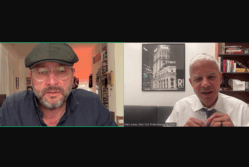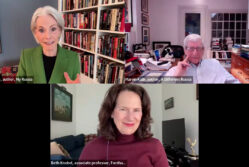Archive Event Highlight

Robert Spiers Benjamin Award Winner Details Deep Reporting on Latin America
by Chad Bouchard
In 2019, Azam Ahmed, New York Times bureau chief for Mexico, Central America and the Caribbean, embarked on a quest to find out what underlying conditions were driving such staggering numbers of Mexicans and Central Americans to seek asylum in the United States.
Those questions led him to locations across the region, where he embedded himself in communities under siege and witnessed firsthand the effects of the drug-fueled homicide crisis gripping the region.
On Dec. 17, the OPC hosted a discussion with Ahmed, whose work won a Robert Spiers Benjamin Award for best reporting in any medium on Latin America. His series, “Kill or Be Killed: Latin America’s Homicide Crisis,” included stories about Honduras, Mexico, Brazil, Guatemala and Jamaica. The moderator was William Booth, London bureau chief for The Washington Post, who served as head judge.
One of the winning stories centered on the arrest of Ovidio Guzman Lopez, the son of infamous Mexican drug lord El Chapo, who was quickly released following drug cartel pressure and intimidation against police and military. Ahmed said the incident spurred the Times team to investigate why the cartel had so much power over security forces. Ahmed, who served as Times correspondent and then bureau chief in Afghanistan, said he recognized sophistication in the cartel’s military tactics and battle plans.
“What we realized pretty quickly when we started going from location to location was that [the cartel] had a plan,” he said. “They had strategic locations that they went to. They staged a jail break so that would further distract from the governmental response to the attempt to take Ovidio. They knew exactly where to block traffic and lock down the city.”
Ahmed said law enforcement and journalists often focus too much on kingpin figures like El Chapo, who he called “just a drop in an ocean of problematic policy,” adding that while drug lords come and go, “what doesn’t change is the nature of drug demand in the United States, and Mexico’s station as the ‘DHL’ of getting drugs into the United States. As long as that dynamic exists, new people are going to test the throne,” he said.
“Since the beginning of the drug war, which has taken so many hundreds of thousands of lives, there are now more deaths in the United States and Mexico from overdose than ever before. “If there is a clearer way to say that this policy is completely bankrupt and doesn’t work, I don’t know it.”
Booth asked about Ahmed’s reporting in Honduras, where he and OPC Award-winning photographer Tyler Hicks embedded themselves in a neighborhood where people were resisting gang violence.
Ahmed said he wanted to demonstrate the inescapable nature of violence there, to provide context and to humanize areas where migrants arriving at the U.S. border had fled from. “A lot of times youths don’t have a choice. Many times, and arguably most times,” he said. “There is an entrapped feeling, and I wanted to figure out how to [report] that.”
Booth asked for insight into how Ahmed handled security and risk in uncertain conditions. Ahmed cited key measures such as live GPS location sharing, frequent updates by text to editors, and making careful logistics and contingency plans. He said for many stories, the only way to report deeply is to take calculated risks and leave the comfort of capital cities and home offices.
“For the stuff that the OPC was kind enough to recognize, you can’t sit in town and do that. You have to be there. You have to smell it, see it, feel it. It’s why I insisted on living in those communities and being intimate with each of these characters to understand as best I can, as an outsider, their lives.”
Watch video clips from the program in the window below.




